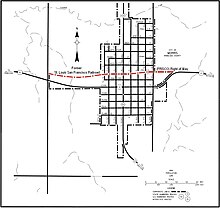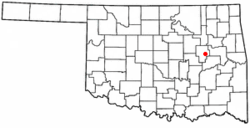|
Morris, Oklahoma
Morris is a city in Okmulgee County, Oklahoma, United States. The population was 1,299 at the 2020 census.[4] HistoryThe community began as a cattle stop on the Ozark and Cherokee Central Railway (later the St. Louis and San Francisco Railway, commonly known as the "Frisco"), which ran between Muskogee and Okmulgee. The post office was established here on January 4, 1904.[5] The townsite was platted in 1904 by L. R. Kershaw, who was an attorney and an immigration agent for the Frisco. He named the town after H. E. Morris, a Frisco executive.[6] Many of the street names in Morris are named after towns that were familiar to Kershaw from his home state of Illinois. Kershaw was also the founder of two of the earliest banks in Morris, Indian Territory: The Farmer's State Bank of Morris in 1905 and the First National Bank of Morris in 1907. Morris's later history includes bank robberies, the most talked about being those by Charles Arthur "Pretty Boy" Floyd, who was popular in the Morris area.[5]  The Morris News, a newspaper founded in 1910, has continued publication into the 20th century.[5] The large early growth in Morris's history came from mineral extraction.[5] Coal lay close to the surface in the area around Morris, and an oil boom developed around the Morris Pool.[5] In more recent times, ranching and farming in the area have aided the town's economy.[5] A tornado struck Morris on April 26, 1984. It killed nine people and destroyed the entire business section, as well as about one half of the housing.[5] GeographyMorris is located 8 miles (13 km) east of Okmulgee, at the intersection of U S. Highway 62 and State Highway 52.[5] According to the United States Census Bureau, the city has a total area of 1.2 square miles (3.1 km2), of which 1.1 square miles (2.8 km2) is land and 0.1 square miles (0.26 km2) (5.17%) is water. Parks and recreationEagle Park, at 1001N North Hughes Avenue in Morris, includes both a playground and a walking trail.[7] The town has the Morris Youth Sports Complex, which hosts Little League tournaments and other events.[8] Lake Eufaula, Oklahoma’s largest lake,[9] is to the southeast.[10] Deep Fork National Wildlife Refuge is to the southwest.[11] Demographics
As of the census[3] of 2000, 1,294 people, 475 households, and 351 families resided in the city. The population density was 1,174.3 inhabitants per square mile (453.4/km2). The 531 housing units averaged 481.9 per square mile (186.4/km2). The racial makeup of the city was 72.87% White, 0.70% African American, 19.55% Native American, 0.08% Asian, 0.31% from other races, and 6.49% from two or more races. Hispanics or Latinos of any race were 1.62% of the population. Of the 475 households, 39.8% had children under the age of 18 living with them, 56.4% were married couples living together, 13.1% had a female householder with no husband present, and 25.9% were not families. About 24.2% of all households were made up of individuals, and 12.0% had someone living alone who was 65 years of age or older. The average household size was 2.72 and the average family size was 3.24. In the city, the population was distributed as 31.0% under the age of 18, 8.8% from 18 to 24, 27.4% from 25 to 44, 19.4% from 45 to 64, and 13.4% who were 65 years of age or older. The median age was 34 years. For every 100 females, there were 88.6 males. For every 100 females age 18 and over, there were 85.3 males. The median income for a household in the city was $29,917, and for a family was $34,943. Males had a median income of $28,295 versus $20,938 for females. The per capita income for the city was $12,904. About 11.2% of families and 15.3% of the population were below the poverty line, including 22.0% of those under age 18 and 9.1% of those age 65 or over. Notable residents
References
|
||||||||||||||||||||||||||||||||||||||||||||||||||||||||||||||||||||||||||||||||||||||||||||||||


